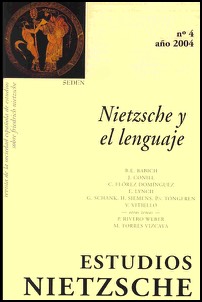Música y palabras en Nietzsche: Sobre la cuestión de la ciencia, el estilo y la música de la tragedia griega antigua
DOI:
https://doi.org/10.24310/EstudiosNIETen.vi4.9137Abstract
Partiendo de un análisis de la condición póstuma de la obra nietzscheana, el trabajo desentraña las características peculiares de su estilo, por las que pensamiento y lenguaje se hallan imbricados de tal manera que cada obra nietzscheana está construida calculando muy cuidadosamente los efectos que puede producir en los diversos tipos de lectores. De aquí que el trabajo reexamine también las distintas formas básicas de leer y considerar a Nietzsche, alejándose de los dos extremos representados por la tendencia historicista dedicada a resaltar las influencias en la obra nietzscheana, y por la tendencia retoricista que insiste en considerar su obra como un puro juego metafórico. La autora encuentra la mejor vía hermenéutica en la consideración que hace el mismo Nietzsche de cómo debemos leer la tragedia griega antigua: ‘oyendo con nuestros ojos’, es decir, buscando la música que hay detrás de las palabras.
Downloads
Metrics
References
Allison, David B., Reading the New Nietzsche, Rowman & Littlefield, Lanham (MD), 2001.
Babich, Babette E., «Nietzsche’s Self-Deconstruction: Philosophy as Style», Soundings. 73, 1990, 50-12,
Babich, Babette, «On Nietzsche’s Concinnity: An Analysis of Style», Nietzsche-Studien, 19, 1990, 59-80.
Babich, Babette, Nietzsche’s Philosophy of Science, State University of New York Press, Albany, 1994.
Gerber, Gustav, Die Sprache als Kunst (2 vols., Mittler’sche Buchhandlung, Bromberg, 1871),
Gustafsson, Lars, Sprach und Lüge. Drei sprachphilosophische Extremisten: Friedrich Nietzsche. A. B. Johnson, Fritz Mauthner, Hanser, München, 1980.
Kremer-Marietti, Angèle, L’homme et ses labyrinthes. Essai sur Friedrich Nietzsche Unions Géneral d’Éditions, Paris, 1972.
Lacoue-Labarthe, Philippe, «Le détour (Nietzsche et la rhétorique)», Poétique, 5, 1971, 53-76.
Liebért, Georges, Nietzsche and Music, tr. D. Pelletier - G. Parkes, University of Chicago Press, Chicago, 2003.
Man, Paul de, «Nietzsche’s Theory of Rhetoric», Symposium: A Quarterly Journal in Modern Foreign Languages, 1974, 33-51 .
Moore, G., Nietzsche, Biology, and Metaphor, Cambridge University Press, Cambridge, 2001.
Nehamas, Alexander, Nietzsche: Life as Literature, Harvard University Press, Cambridge (MA), 1985.
Porter, James, The Invention of Dionysus: An Essay on the Birth of Tragedy, Stanford University Press, 2000.
Rée, Paul, Basic writings, Univ. of Illinois Press, Urbana, 2003. .
Simon, Josef (ed.), Nietzsche und die philosophische Tradition, Königshausen & Neumann, Würzburg, 1985,
Simon, Josef, «Grammatik und Wahrheit: Über das Verhältnis zur metaphysischen Tradition», Nietzsche-Studien, 1, 1972.
Downloads
Published
How to Cite
Issue
Section
License
As of issue 21 (2021) this journal is published only in open access (diamond route).
From that number 21, like the previous numbers published in NIETZSCHE STUDIES, they are subject to the Creative Commons Acknowledgment-NoComercia-ShareIgual 4.0 license, the full text of which can be consulted at <http://creativecommons.org/licenses/by-nc-sa/4.0 >
It is the responsibility of the authors to obtain the necessary permissions of the images that are subject to copyright.
This work is licensed under a Creative Commons Attribution-NonCommercial-ShareAlike 4.0 International License.
Copyright generates two different rights: moral rights and patrimonial rights that EJFB recognizes and respects. Moral rights are those relating to the recognition of the authorship. They are rights of a personal nature that are perpetual, inalienable, unseizable and imprescriptible as consequence of the indivisible union of the author and his/her work.
Patrimonial rights are those that can be derived from the reproduction, distribution, adaptation or communication of the work, among others.







11.png)
